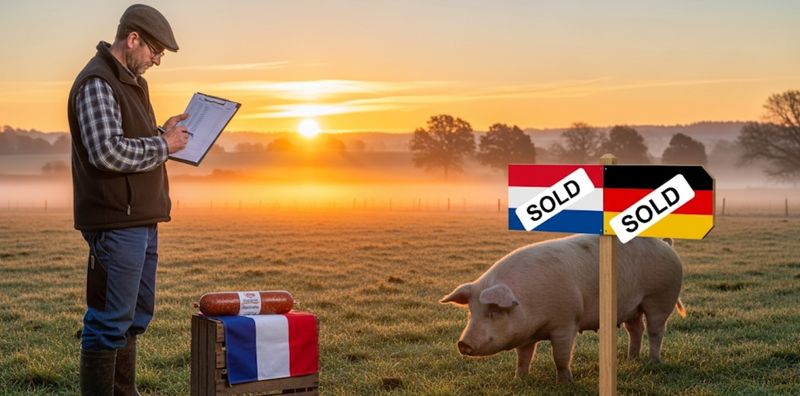
Published in News
Market Pulse: UK Labour Costs, a Major Dutch Co-op Divestment, and French Export Success
The Bank of England links high food inflation to rising labour costs, Dutch co-op Vion sells its German sausage division, and French cured meat producers report strong export growth.

Bo Pedersen
Chief Revenue Officer
UK Market: Bank of England Links Food Inflation to Labour Costs
What happened: The Bank of England has warned that rising labour costs are a significant factor contributing to the UK's persistently high food price inflation. In its latest report, the Bank noted that while global commodity prices have had an impact, higher employment costs along the supply chain are being passed on to consumers, keeping UK food inflation above the EU average.
Why it matters: This is a significant statement from the UK's central bank, providing official backing to what the industry has been reporting for months. It shifts the inflation narrative beyond just commodity prices and focuses attention on the structural costs within the UK economy, including wages and a tight labour market. For processors and manufacturers, it provides clear evidence to present to retailers during cost price negotiations.
Implications & suggested actions:
Processors & Manufacturers: Use the Bank of England's official analysis to support your discussions with retail customers about the necessity of price increases. This is no longer just an industry argument; it is a macroeconomic reality identified by the central bank.
Farmers: The focus on labour costs throughout the supply chain means there will be continued pressure on your direct customers. Demonstrating efficiency and being a reliable, cost-effective supplier remains paramount.
Retailers: This report underscores the fact that price increases from your suppliers are driven by legitimate, economy-wide cost pressures. A collaborative approach to managing these unavoidable costs will be more effective than simply resisting price adjustments.
Corporate Strategy: Vion Sells German Sausage Business
What happened: Dutch agricultural co-operative Vion Food Group has announced the sale of its German sausage and canned goods division to a group of local investors. The move is part of Vion's wider strategy to divest from non-core activities and concentrate on its main slaughtering, deboning, and fresh meat operations in the Benelux region and Germany.
Why it matters: This is another major step in the strategic realignment of one of Europe's largest meat processors. By selling off a value-added, but non-core, division, Vion is streamlining its business to focus on what it does best: primary processing. This move allows the new, more agile local entity to focus entirely on the specific demands of the German sausage market.
Implications & suggested actions:
Processors (Competitors): Vion's move highlights the strategic choice between being a primary processing specialist versus a diversified, value-added manufacturer. Review your own portfolio to identify which parts of your business deliver the best returns and align with your core strengths.
Wholesalers & Retailers (Germany): The ownership change for this significant sausage supplier could lead to changes in product focus, branding, or customer service. Engage with the new ownership team to understand their future plans and ensure continuity of supply.
Farmers & Suppliers: A more focused and financially stable Vion is a more secure partner for the long term. This divestment should strengthen the company's core business, which is good news for its livestock suppliers.
International Trade: French Cured Meat Exports Show Strong Growth
What happened: The French cured meats sector has reported a 9% increase in export value for the first half of 2025. The growth was particularly strong in other EU markets, with Germany, Belgium, and Spain leading the way. The industry federation, FICT, attributed the success to a focus on high-quality, traditional products like saucisson sec and jambon de Bayonne, which are resonating with European consumers.
Why it matters: This is a significant success story for a high-value, traditional sector. It demonstrates that even in an inflationary environment, there is strong consumer demand for authentic, high-quality European products with a clear regional identity. The focus on intra-EU trade highlights the resilience and importance of the single market for value-added food products.
Implications & suggested actions:
French Producers: This is clear validation for your focus on quality and tradition. Continue to invest in promoting the unique attributes of your regional specialties to build on this export momentum.
EU Competitors: The French success provides a strong case study. For producers in other countries, it highlights the opportunity to grow by focusing on your own unique national or regional cured meat traditions, rather than competing solely on price.
Retailers & Importers: There is a clear and growing demand for authentic, high-quality charcuterie from across Europe. Ensure your range reflects this by offering a diverse selection of products from different regions and clearly communicating their provenance to your customers.
Sources
Bank of England August 2025 Monetary Policy Report - Bank of England (21 August 2025)
Vion Food Group announces sale of German sausage division - Lebensmittel Zeitung (22 August 2025)
French cured meat exports rise 9% in first half of 2025 - FICT (French Federation of Meat Processors) (22 August 2025)
